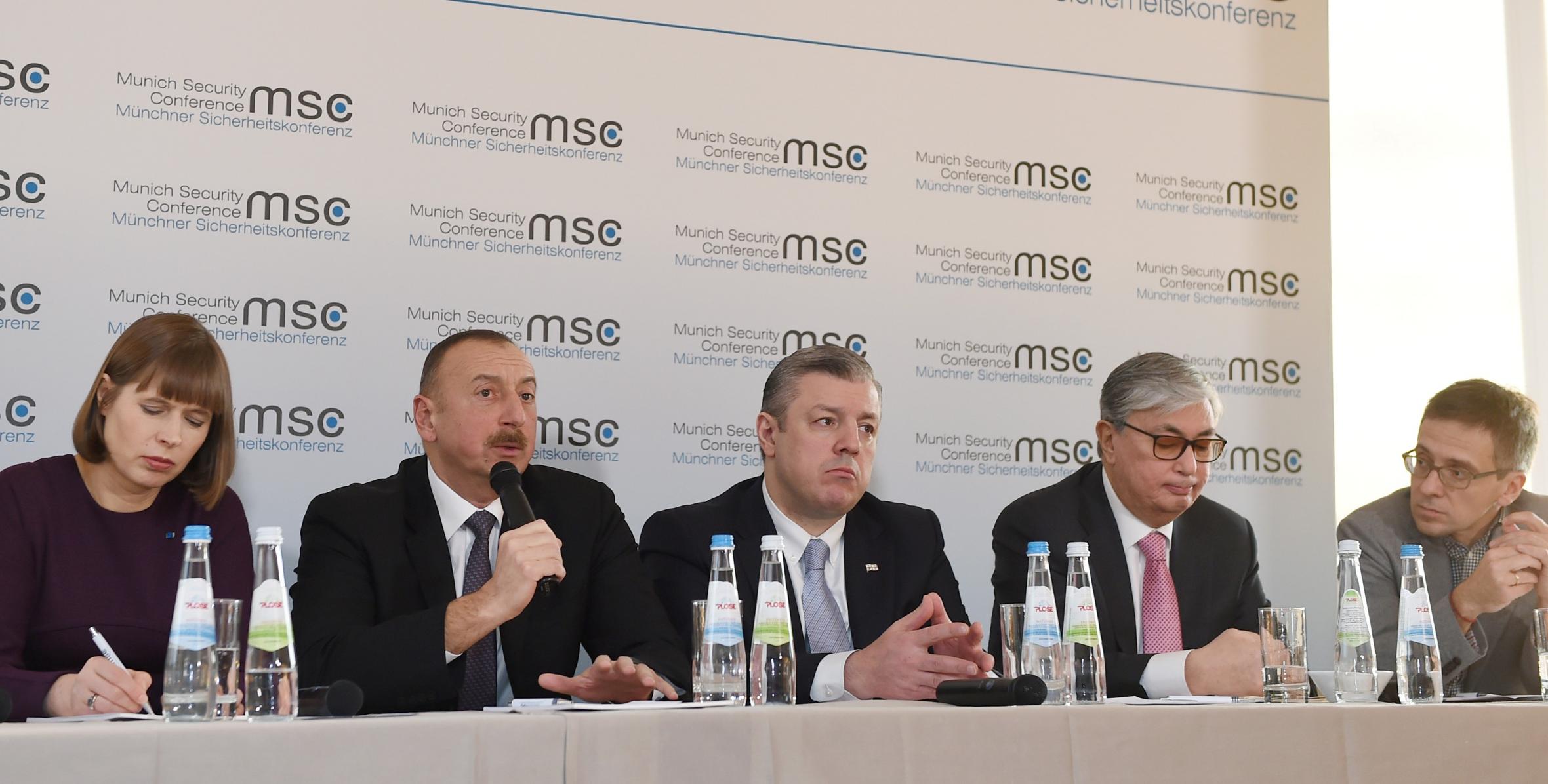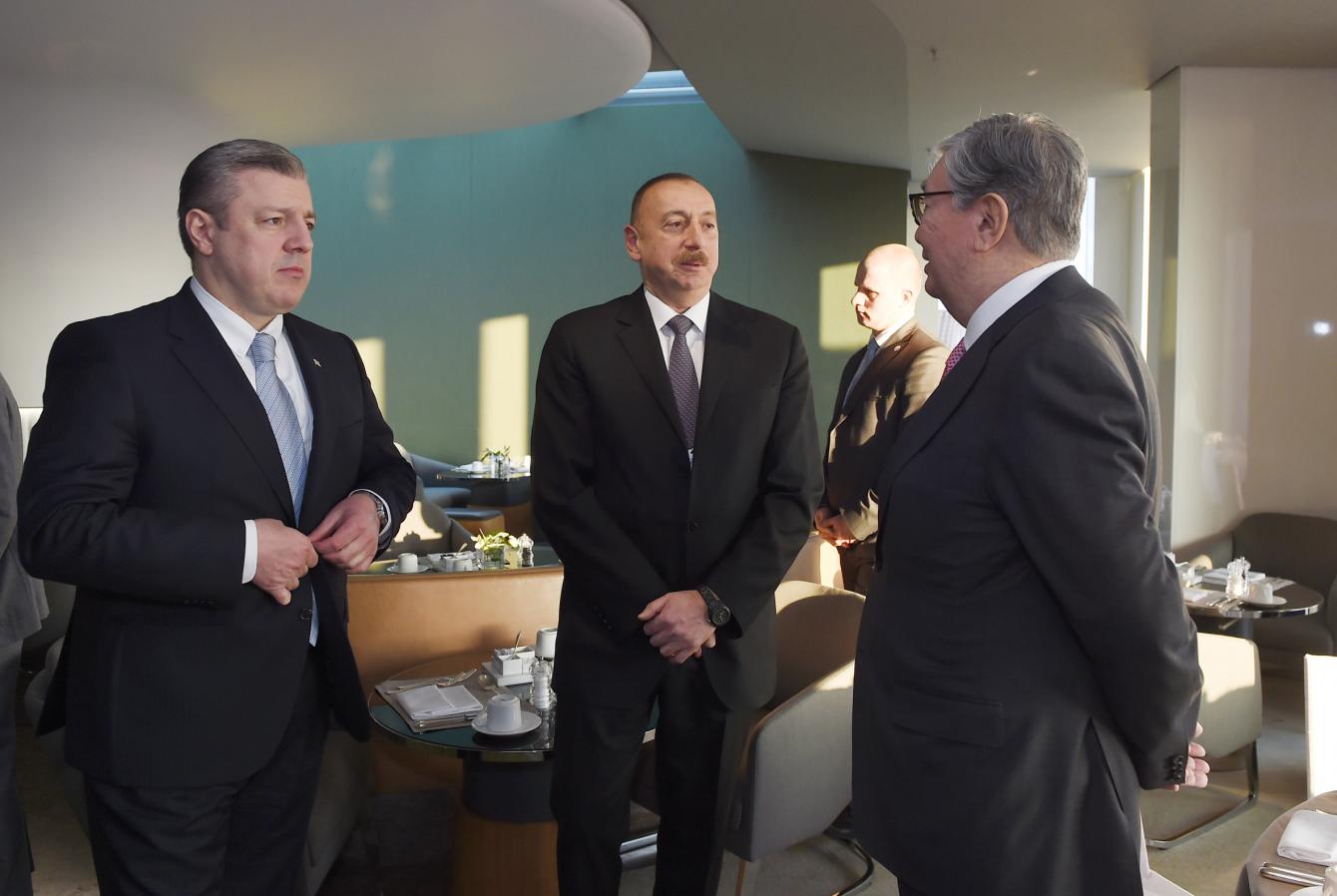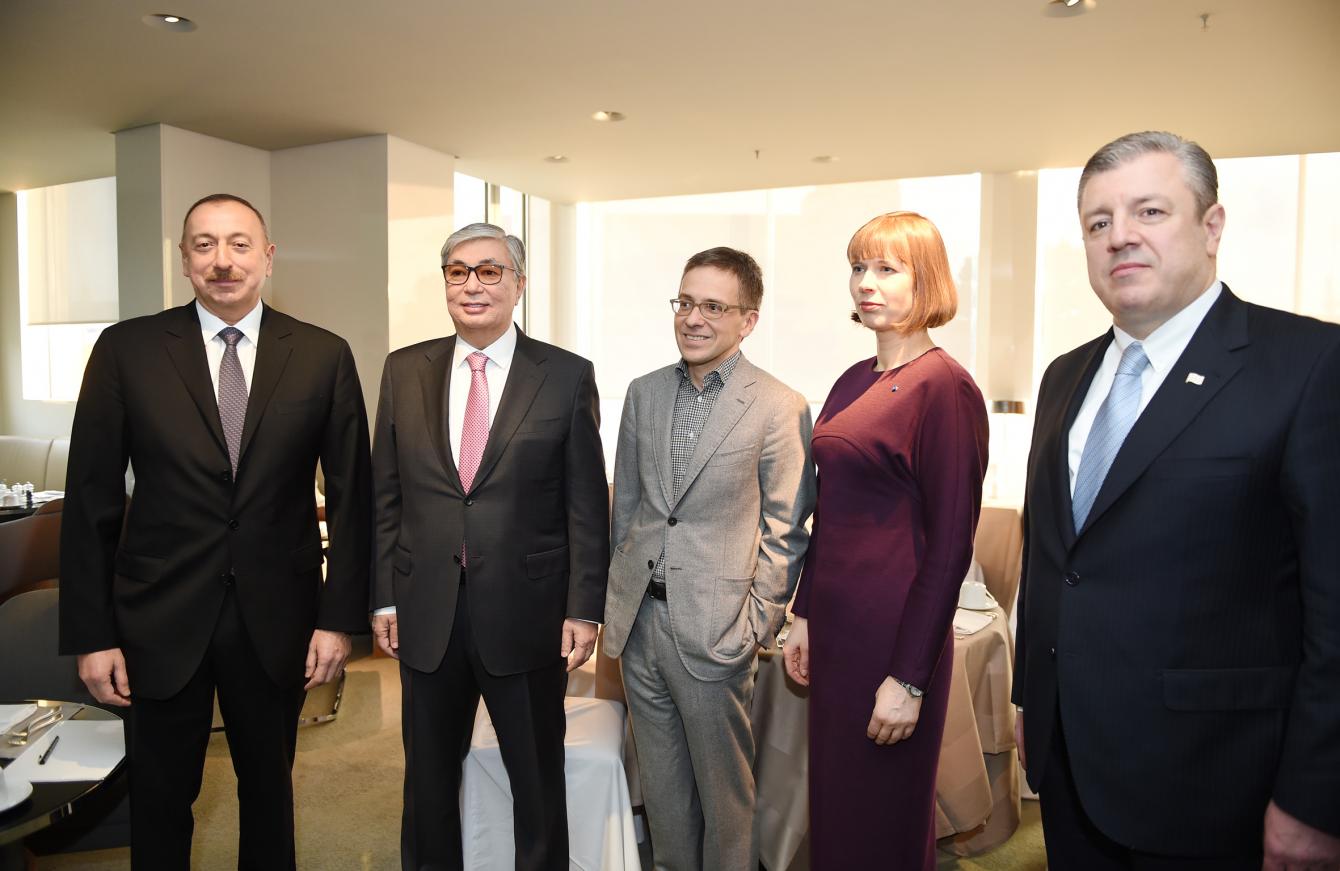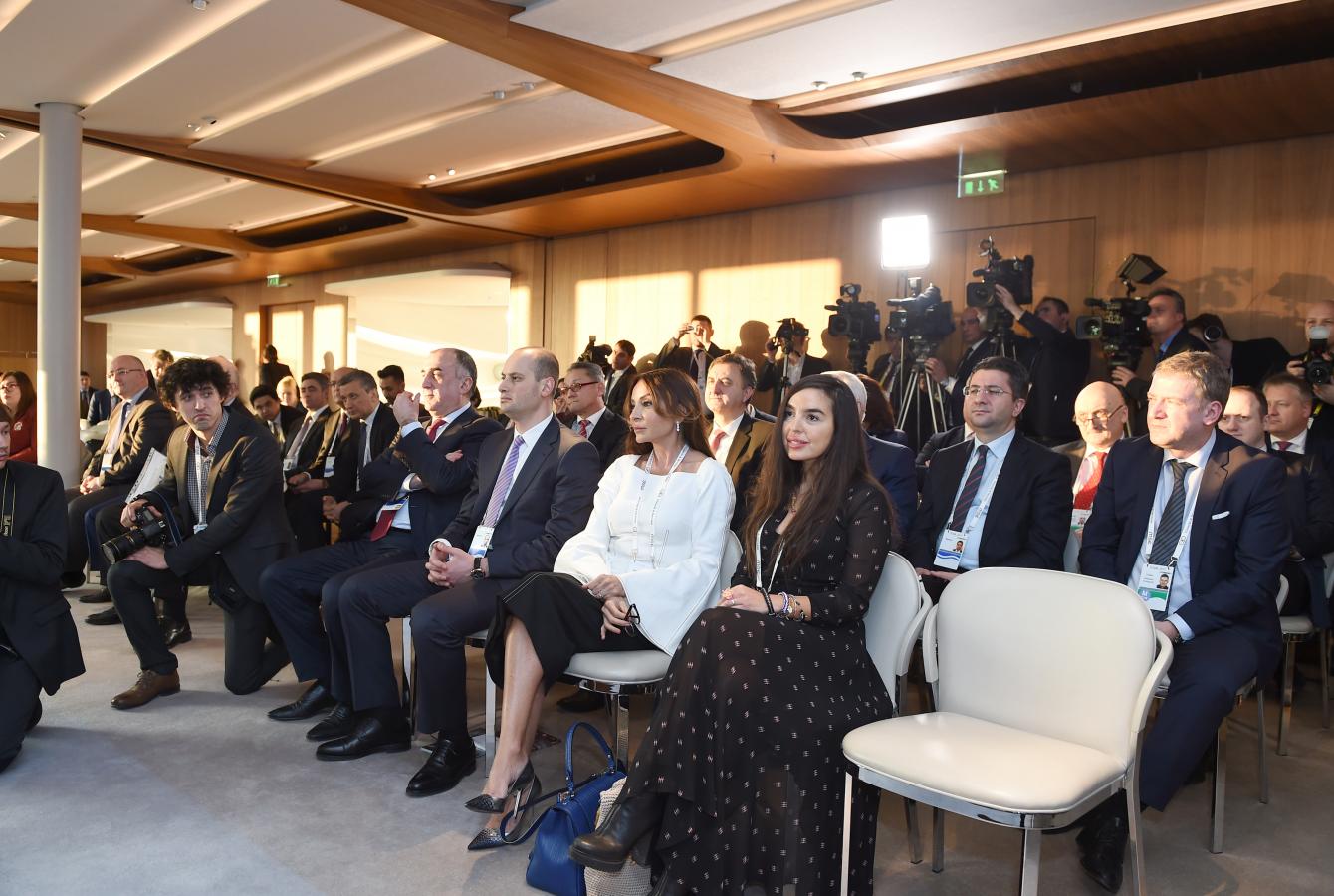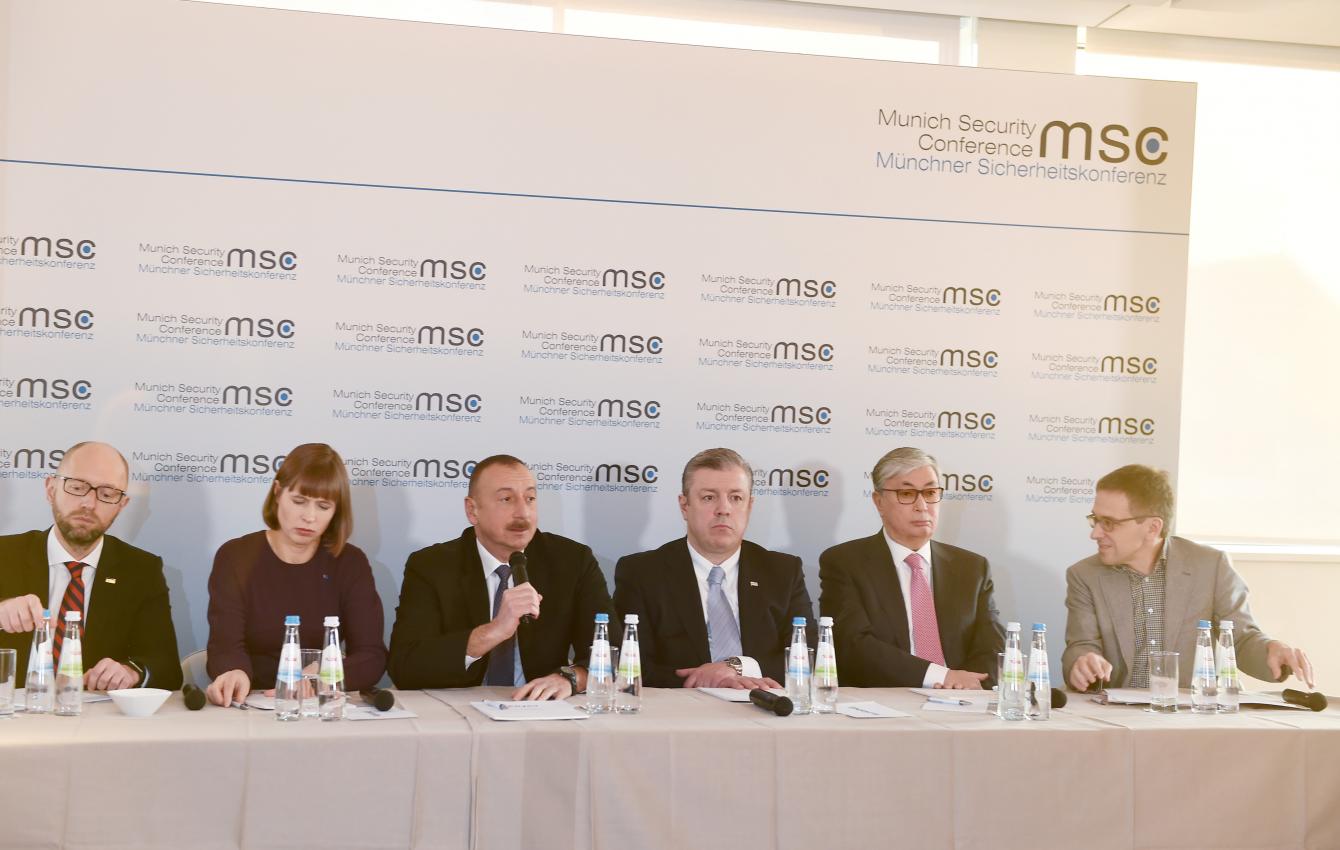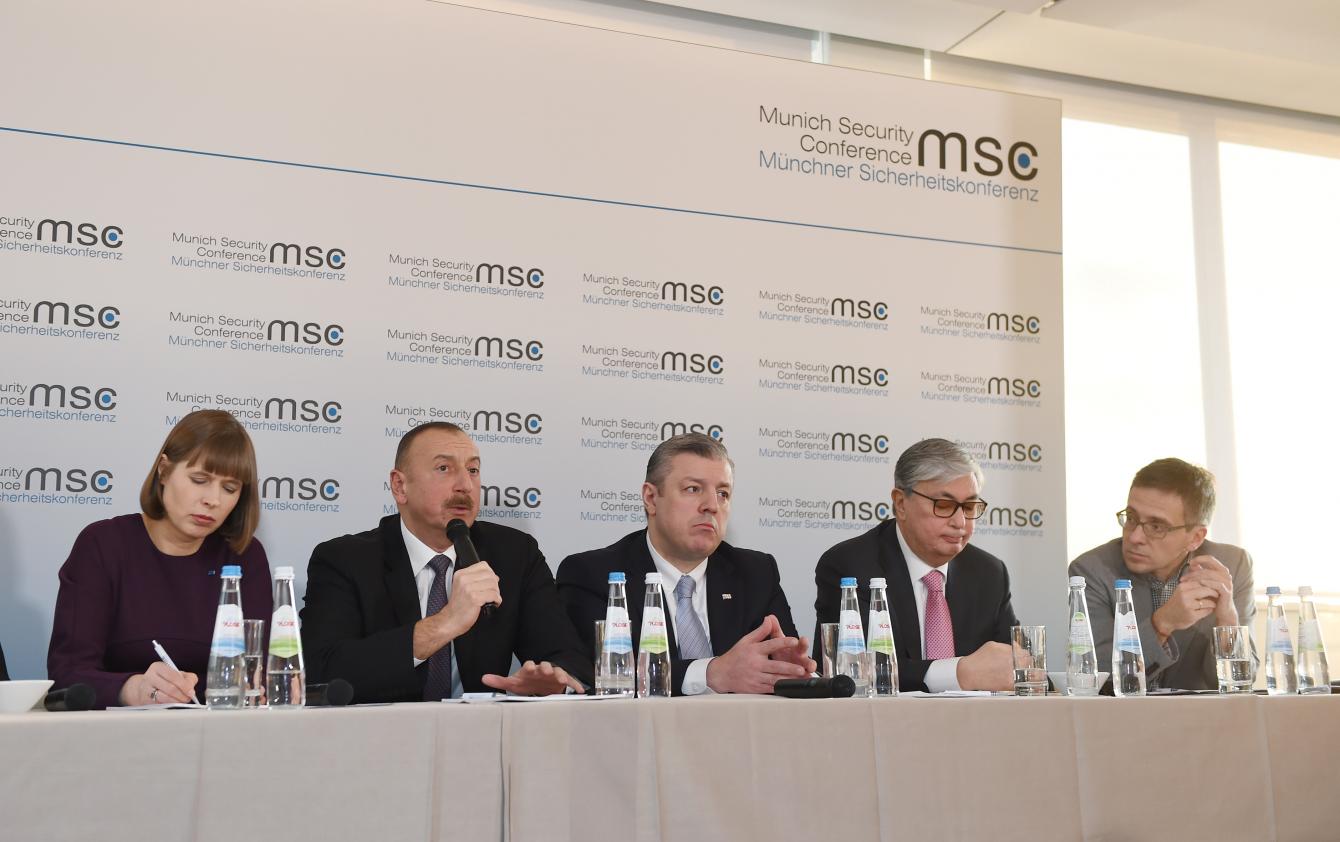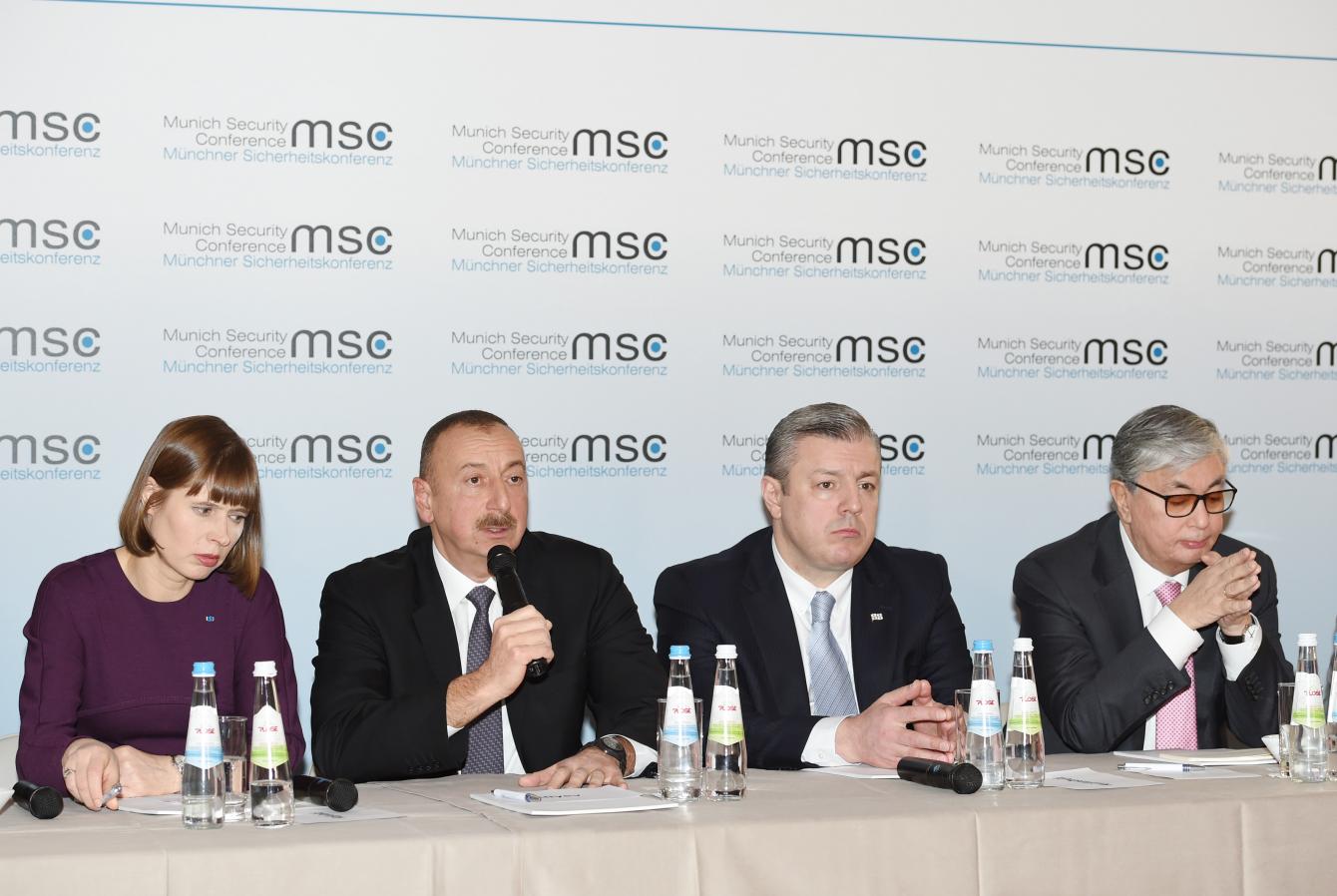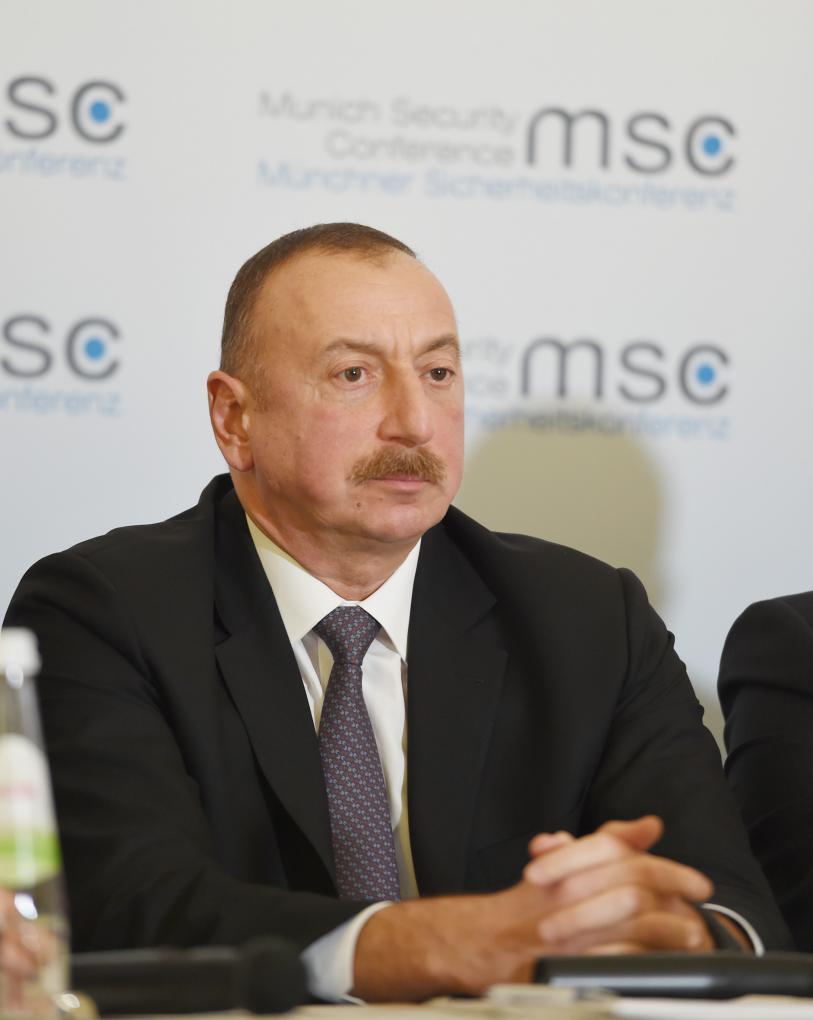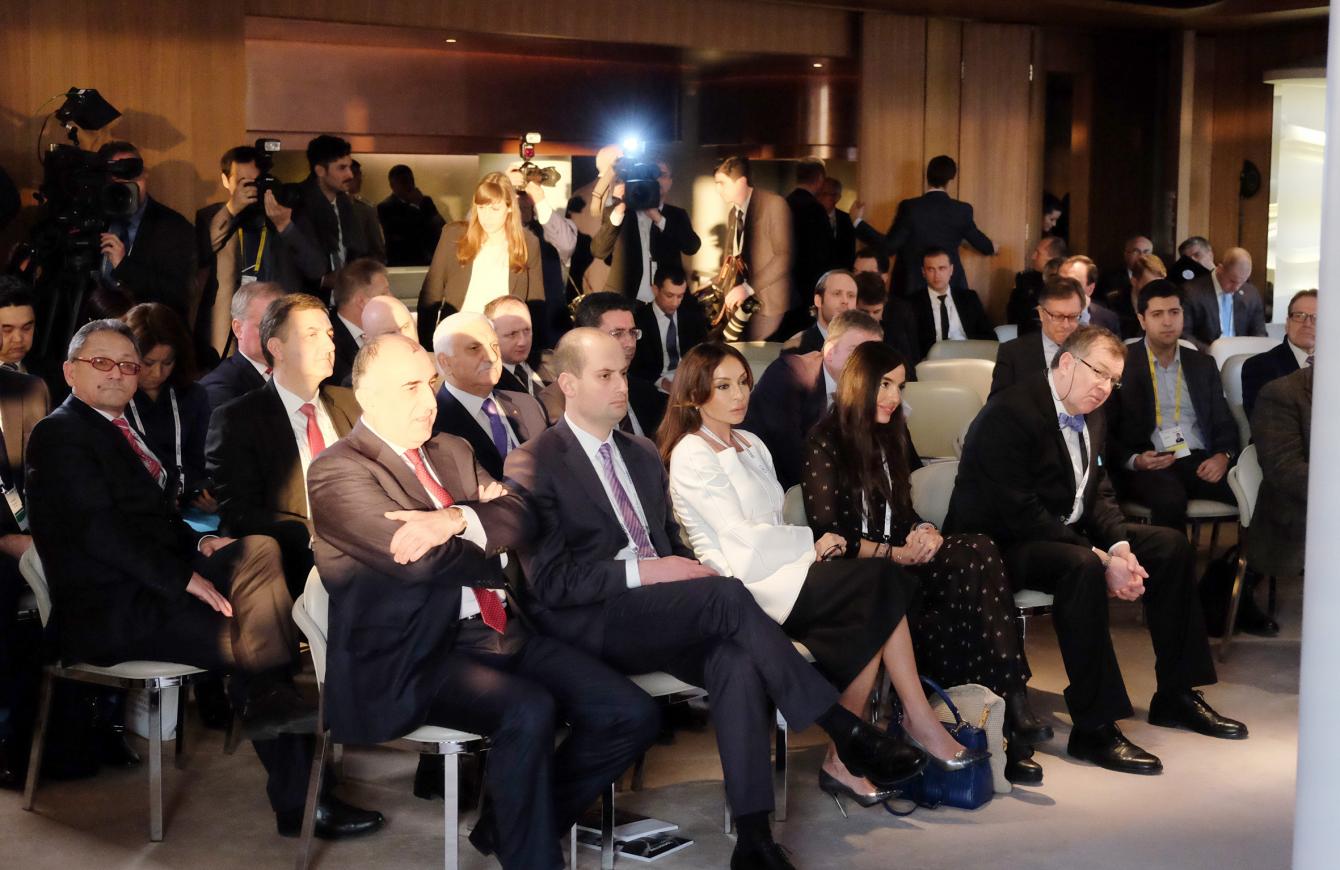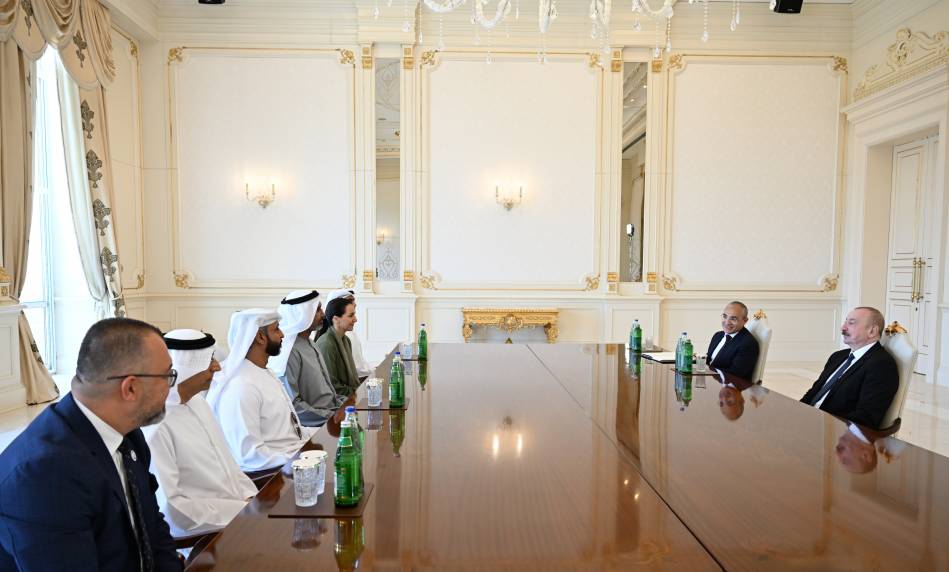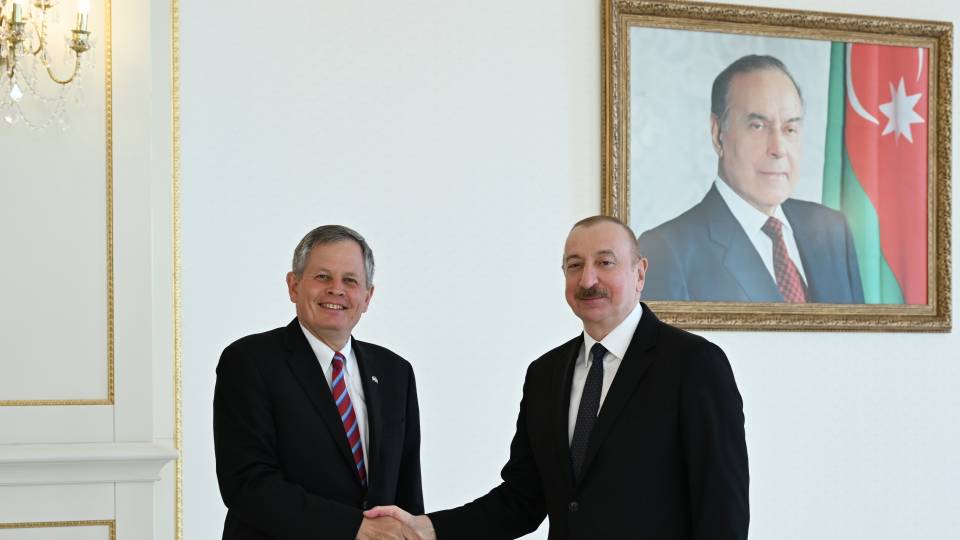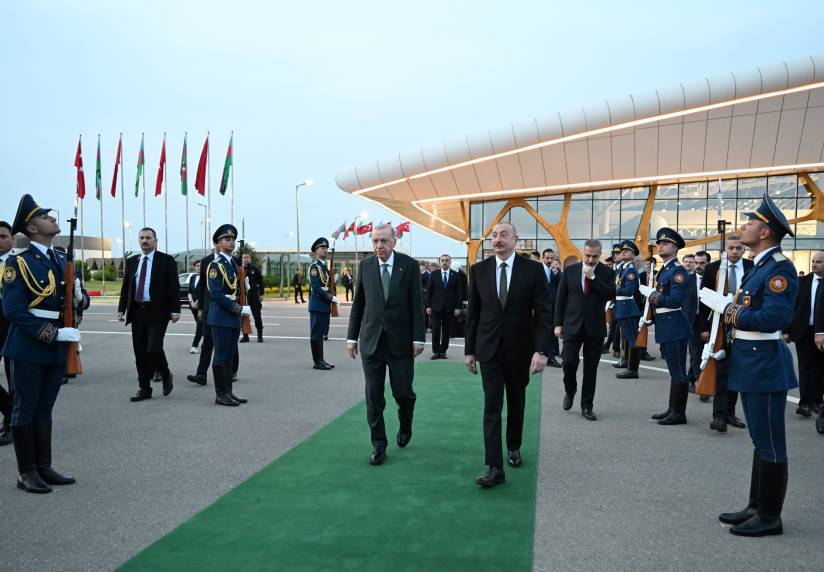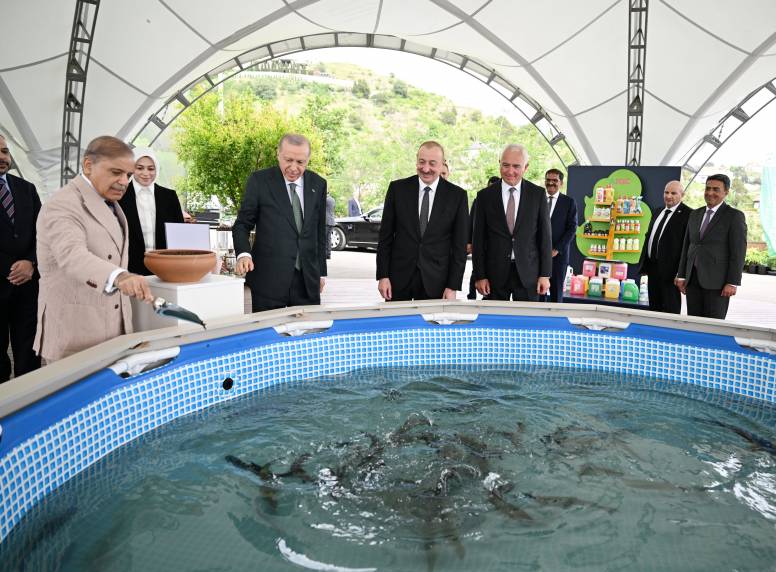President Ilham Aliyev has attended "The Fault Lines of Eurasia" panel discussion at the Munich Security Conference.
Azerbaijan`s first lady Mehriban Aliyeva and vice president of the Heydar Aliyev Foundation Leyla Aliyeva also attended the event.
The panel discussion was moderated by President and Founder of Eurasia Group Ian Bremmer.
Moderator Ian Bremmer:
It is a pleasure to introduce you to an extremely distinguished group. Everyone here knows why they are here. The Munich Security Conference has been particularly replete with uncertainties and question marks. Eurasia is one of our more stable regions. And that has not always been the case.
There are a couple of points that I would like to raise just to start before introducing our panelists. If I look at Eurasia today, I am struck in some way about how the region looks so little bit like what the rest of the world might look like in the future. Number one – countries are generally minding their own business. There is very little ideological interference in each other`s affairs. You don’t see Kazakhstan telling Russia how to reform. You don’t see Azerbaijan telling Georgia what to do internally. You also see Russia and China co-existing side by side, and sometimes even working together hand in hand, supporting an alternative to the Western order such as Shanghai Cooperation Organization. And finally in terms of globalization, which is very interesting, you see supply chains that aren`t global, but are transnational working along a more bespoke hub model rather than a top-down globalization model, particularly “One Belt, One Road”.
So the question of to what extent Eurasia represents the way the world is going to look increasingly in the future for good and for bad, I think, is an interesting one. But, of course, there are also some risks. But while countries aren’t meddling in each other’s affairs ideologically, they do clash. That is clear in terms of Russia-Ukraine. That is clear in terms of Uzbekistan and some of its neighbors. And more importantly the question of the long-term sustainability of Russia-China relationship. And then finally you have the question of political sustainability long-term given rising populism, low oil prices, ISIS, terrorism, radicalism. To what extent are we going to have sustainability questions politically in Eurasia as well? So, Eurasia raises some key questions about the future of the global order in terms of security, in terms of trade, and in terms of political mandate.
I am delighted that in that context we have a truly outstanding panel that is pretty unique here at the Munich Security Conference. We have the President of Azerbaijan, Ilham Aliyev. We have the President of the Republic of Estonia, Kersti Kaljulaid. We have the Prime Minister of Georgia Giorgi Kvirikashvili. We have the chairman of the Senate of the Kazakh parliament, the former prime minister Kassym-Jomart Tokayev. And we also have the former Prime Minister of Ukraine and now head of the Narodniy Front political party, Arseny Yatsenyuk. I also see a lot of decision makers in the region in the audience. And I am looking forward to getting to all of you.
So with that to talk about their views, some initial interventions on the fault lines in Eurasia and the prospective on where the region is heading in this global context let me first go to Mr President of Azerbaijan Ilham Aliyev.
President of Azerbaijan Ilham Aliyev:
Azerbaijan is situated between Asia and Europe. And our geographical location actually determines the geopolitical situation in our region. Azerbaijan for centuries was a country, area, where civilizations met and today, we preserve our historical heritage. We are proud to become one of the world’s centers of multiculturalism. Geographical location, at the same time, good relations with the neighbors allowed us to become a very reliable partner in the region, which introduces initiatives, which serve the best benefit of the peoples who live in our region.
Azerbaijan is a reliable partner on international arena. We are a young country. Last year we celebrated 25thanniversary of restoration of our independence. And during this short period of time, I think, today in the world Azerbaijan is a country, which is respected. And the best sign of that was several years ago demonstrated in the United Nations when Azerbaijan was elected with the support of 155 countries as a non-permanent member of United Nations Security Council. So, that was a real appreciation of the absolute majority of international community of our activity. That was a sign of trust and respect.
We transformed our economy from planned economy to market economy through implementing reforms. Today, the share of market economy is more than 80 percent in our GDP. Azerbaijan introduced a new format of regional cooperation with our neighbors. At the same time, energy and transportation projects, which we initiated more than twenty years ago, today bring good results not only to us, but also to the region. The issues of energy security today cannot be separated from the issues of national security. Our policy is aimed at strengthening cooperation first of all with our neighbors, at the same time, with Muslim world, we are part of the Muslim world, and with Europe. And we already started just recently negotiations with European Union on the new agreement, which will cover many areas of cooperation.
We are one of the very few countries, which is a member of Islamic Cooperation Organization and Council of Europe at the same time. In 2015, we organized the first inaugural European Games. This year we will host Islamic Solidarity Games. So this actually shows our intentions. And we contribute a lot to the dialogue of civilizations and cultures.
Among the concerns we are facing the biggest one is continued occupation by Armenia of the territory of Azerbaijan, which resulted in ethnic cleansing and occupation of twenty percent of our territory by Armenia. United Nations Security Council adopted four resolutions demanding withdrawal – immediate and unconditional – of Armenian troops from our territories. They remain on paper for more than twenty years. Settlement of all the conflicts must be based on the same principle, on the same approach. Territorial integrity of every country must be respected, it cannot be violated, and internationally recognized boundaries cannot be changed by force. The conflict between Armenia and Azerbaijan is the biggest threat also to the region. And our constructive policy is aimed at the soonest, peaceful resolution of the conflict based on the resolutions of Security Council of United Nations and other important organizations.
Now, I will conclude because I was told that for initial presentation we have five minutes. Later, of course, with pleasure I will answer your questions. Thank you.
Moderator Ian Bremmer:
Thank you very much Sir. Let’s stick in the region and move to Georgia. Prime Minister Kvirikashvili, please.
Georgian Prime Minister Giorgi Kvirikashvili:
Thank you. Thank you for this opportunity. Well, let me start with the challenges facing the European Union. We are here to discuss the security issues of the Eurasian continent in general. And the challenges are different, multi-dimensional. We have hot conflicts, we have frozen conflicts. And at this backdrop, stability of small countries is extremely important. This is why I would like to bring Georgia’s case as a country, which strives to be a member of European family and Euro-Atlantic community, a country, which is building stable future despite all the challenges. And the challenges are quite serious – Georgia’s territorial integrity is violated. Two of our historic territories are occupied by Russia. But even at this backdrop, we try to stay consistent, first of all, with our foreign policy goals and also constructive to prepare for a long-term solution of our problems.
Georgia signed Association Agreement very recently with the European Union, and part of that agreement is deep and comprehensive free trade area agreement. Our integration into the NATO structures is increasing. We are part of peacekeeping operations in Afghanistan, one of the biggest contributors. We are participating in Central Africa peacekeeping operations with the European Union and we are becoming step-by-step, gradually part of European order. This is not a loud word because Georgia is building a system, which is closely in line with European standards.
But regional cooperation remains one of the cornerstones of stability in the South Caucasus. And there we have excellent regional projects, linking Azerbaijan, Georgia, and Turkey through the Baku-Tbilisi-Kars railway project. We have new opportunities arising from the Silk Road Economic Belt “One Belt, One Road” initiative linking Europe and Asia.
And I should say that Georgia is the Christian country on the most eastern flank of the European Union and Europe. We are a European country historically and we are a country, which has free trade agreements with all of our neighbors, with the European Union. And we recently finalized free trade negotiations with China.
So we are a country with 3.8 million population having free economy, open economy. Just several days ago a heritage foundation published new rankings and Georgia is 13th freest economy in the world. We are number 16 in doing business ranking according to World Bank. We have very strong positions in democracy rankings and we step by step begin improving to our Association Agreement guidelines, which we have.
The most important thing is that our foreign policy aspirations are not only foreign policy. This is something that defines our internal reform agenda. And internal reform agenda is quite extensive. We set education as number one priority for the country, matching the gaps between demand and supply of education system. We set the professional education as the high priority according to German-Swiss-Austrian dual education system.
We set government reform as one of the highest priorities taking experience from Estonia on e-governance, one-stop solution concept. And we liberalized our tax system starting from January 1st of this year abolishing profit tax and taxing only dividends.
We are making massive investments in the infrastructure modernization. And again we have important regional projects as we are on the crossroads between Europe and Asia, and Russia, and the Middle East. So, regional cooperation and regional stability remains the cornerstone of stability in our region. At this quite challenging backdrop, we are trying to give some example of using all resources to create inner stability in order to provide long-term development prospects for our country. Thank you.
Moderator Ian Bremmer: Thank you Sir. And now chairman Tokayev.
Chairman of the Senate of the Parliament of Kazakhstan Kassym-Jomart Tokayev:
Thank you. Kazakhstan has the second largest economy in the post-Soviet area, and is open for international cooperation. And we are very much proud to have excellent relationship with our immediate neighbors, first of all Russia, and China. It’s a matter of our security, it’s a matter of our successful economic development. And we do fully realize the importance of having good and predictable, friendly relationship with our immediate neighbors. We have no territorial issues with all our neighbors since the longest on-land border between both Kazakhstan and Russia has been demarcated and ratified by both parliaments. And the same thing goes to our border with China as well as other central Asian countries. We are in the process of reforms. And truly Kazakhstan is a reformist country. We strongly believe that we should not stop the transformation of our society either in the economic area, or in the political domain. We strongly believe that the structural reforms must go on in any circumstances so that Kazakhstan could advance into to the group of 30 most developed countries in the world. Kazakhstan is a member of Security Council of United Nations. And we are making emphasis on our cooperation with United Nations as an indispensable organization, as a universal organization in the world.
Our priority in United Nations is to stop the spread out of nuclear materials as well as other nuclear weapons since we are very much concerned about the possibility of nuclear materials` falling into the hands of terrorists. Imagine that nuclear materials or even the weapons will be possessed by such terrorist groups like Boko Haram or whatever. And we can imagine that the whole world order will be totally destroyed by the terrorists. So it’s our priority to take care about security at least in our part of the world. For that reason, Kazakhstan is involved in promoting the confidence building measures in Asia. And we are very much active in the Shanghai Cooperation Organization.
Speaking about the economic cooperation in our part of the world, in Eurasia, I would like to make emphasis on Chinese concept “One Belt, One Road”. This concept was announced by Chairman Xi Jinping in Astana in 2013. We believe that this concept is very much promising because it will provide all the countries around China, in Eurasia, with a huge opportunity to transport commodities across the territory of Kazakhstan. So, Kazakhstan is expected to become a transit territory.
In the contemporary conditions of economic cooperation, to become a transit territory is extremely important, is extremely promising, is much better than to export oil and gas. There are so many countries having transit opportunities that thrive to transfer or to ship commodities across their territories. So, we believe that in five years more than one hundred thousand containers from China will be transported across the territory of Kazakhstan further to Europe. And, of course, in this chain of trade within the framework of “One Belt, One Road” concept the role of Russia is going to be quite prominent. So, these are my brief remarks. Thank you very much.
Moderator Ian Bremmer:
Thank you so much. Now Arseny Yatsenyuk from Ukraine, please.
Former Prime Minister of Ukraine Arseny Yatsenyuk:
Let me go back to the fault lines in Eurasia. If I may remind you 10 years ago President Putin delivered a challenging and notorious speech at the Munich Security Conference. Some folks in the free world expected that this is just the lip service. But what happened? The Russian Federation invaded Georgia. Russia suspended and in the end withdrew from the Treaty on Conventional Armed Forces in Europe. Russia committed an international crime when they illegally annexed Crimea. Russia sent its military to Donetsk and Lugansk. Russia waged a cyber war against the free world. Russia waged a propaganda war and meddled into the elections and will meddle into the European elections too.
So we are living in a very insecure world. And the fault line is in Russia. I can tell you on behalf of the Ukrainian people that my country is at the state of war that was waged by the Russian Federation. We lost ten thousand people. We lost twenty percent of the Ukrainian economy. We lost Crimea and we practically lost Donetsk and Lugansk. We are the only country who deterred the Russian military. And what is at stake today? At stake are the values of the free world. At stake is the independence and territorial integrity not only of Ukraine, but of every single country sitting at this table.
What needs to be done? Well, the best option and the best remedy is that we need to stay united and to stick to our values, values of democracy, values of the free world, values of the free media. We need to support every single country and to respond and to act in concert. We, as Ukrainian people, are facing a very challenging time. Extremely one. Despite, the military aggression waged by the Russian Federation, we passed outstanding economic reforms. Could you imagine, for example, that just in one year we cut the budget deficit from 10 percent to 3 percent. We passed four austerity packages – much more severe than even in Greece.
So, our economy is rebounding. But, for today the key issue for my country and the key issue for every member of the free world is how to make Russia not just cooperative, but how to make Russia stick to its international obligations, not to intimidate its neighbors, respect the UN Charter and respect independent nations, which Ukraine presents.
Moderator Ian Bremmer:
Thank you Sir. And finally President of Estonia Kaljulaid.
President of Estonia Kersti Kaljulaid:
Thank you for your introduction. It was quite interesting. You said that in Eurasia people had somehow learned to peacefully co-exist and they manage neighbors peacefully. As far as I know Europe and Asia form Eurasia, and you have Georgia and Ukraine here. So, I was wondering a little bit because it is really sad what happened with these two countries. But what happened with these countries? Indeed, they were standing on a very important line. I don’t know whether that was a fault line or not a fault line. But their people expressed their democratic will to belong to the European values and system. And both countries were actually punished for that. That one now definitely is a fault line. And I think we should all consider carefully how we can push that fault line back.
For my own country, I look this panel spans from Baltics to Pamirs. So it’s definitely more diverse than the yesterday evening`s NATO panel where we had five ministers of defense stay in Brussels where they rehearsed their similar lines for two days. We will have much more different views on this panel, I am quite sure.
For me it’s very important to realize that market economy and rule of law do guarantee you foreign investment to certain extent. But then you need to develop deeper. You need to develop to give people the freedom of speech, make sure that human rights are respected and that your country has low level of corruption. I’m telling this because of our experience. In 25 years, Estonia has turned from a country, which needed help exactly the same way as everybody who was just released from the prison of Soviet Union. And when the democratic countries were helping us financially to create institutions and build them they didn’t know that in 25 years they will have a digital country, which can teach something to the same western European countries. It’s payback time for us now.
And if I examine the different development paths of different countries who lived for the several decades under the Soviet Union rule, the difference seems to be that the quicker you realize that you need full freedoms for your people, the better you do. No doubt about that. I don’t know why? Probably because of our history, we actually fought not only for freedom from Soviet Union, but also for freedom of speech. You did not have that in the Soviet Union. Also for freedom to develop your business, you didn’t have that in the Soviet Union. We fought for all that peacefully. Maybe I shouldn’t be using this word behind this table I apologize to my neighbors who have fought really. I think we should not forget that the fault line is not a constant line. The fault line can move back and forth. But there should always be the will of the people, which way they want to go.
Moderator Ian Bremmer:
Thank you very much. So, we have a lot of time, which is great, and a lot to discuss very different presentations from the panel. I want to dig into it. Let me just respond to the President. Of course, at the beginning I was starting with the good news, which was that we don’t have the countries ideologically telling others which kind of systems they should have. But then I said the bad news that we have interventions and wars and the rest. And I’m going to start with the good news again. We clearly should start with Russia because everyone on this panel has a strong and personal perspective on it. And I want to start with Chairman Tokayev. You have the largest Russian population on your territory. And yet you have managed, and your country has managed to have a reasonably peaceful co-existence both internally and also with Russia. As we are going to get into some vastly more difficult relations with Russia, I wonder if you could share some lessons how you think Kazakhstan has managed that?
Chairman of the Senate of the Parliament of Kazakhstan Kassym-Jomart Tokayev:
Historically, we are pretty much tolerant to different cultures and religions. Of course, we have today enough other cultures. And speaking about languages from the very beginning we said that Kazakh language will become a state language in Kazakhstan, but with regard to Russian language, which is popular in Kazakhstan, we believe that knowing Russian language is a huge asset for us. It has been said by the President that it will become an official language in our constitution. To fight against languages from my perspective is a very stupid thing. The more languages we know, the better for us, for our population.
Now we promote English as the third unofficial language. Perhaps, God knows, some time later it will become one of the official languages of Kazakhstan. But we acknowledge that the knowledge of English is extremely important, particularly for the younger generation. So to be tolerant, to be wise, to be reasonable, is one of the receipts, if I may say so, of sustaining stability within a country. And without stability in the country there is no possibility, there is no opportunity to pursue economic reforms. We believe that religious accord within Kazakhstan is also extremely important to taking advantage of all existing opportunities to promote economic reforms. Kazakhstan hosts summits of leaders of traditional world religions in order to bring together all the politicians as well as religious leaders to the same table to talk about peace, tolerance in the global dimension.
At the last summit the Secretary-General of the United Nations, King of Jordan, President of Finland, as well as many other politicians, including heads of international organizations were attending and talking about peace, security and stability in Eurasia as well as beyond.
Moderator Ian Bremmer: So that was the good news. Now everybody else on this panel has faced different levels of interference, intervention and in some cases direct war with the Russians. I want to ask why you think the threat has become what it is. We saw last year that so many people have said that Putin is the geopolitical winner, that he is increasing his influence. Is that that? Is that that Putin has become so much stronger as an individual? Is that that the Russian economy is in comparative decline, not doing so well? Is it still a Soviet imperial hangover? What is it that drives the challenges with the Russians that so many in the region presently have? Is it even the lack of support internationally from outside? May be I should start with the person who has had the greatest challenges. And that is, of course, former Prime Minister Yatsenyuk.
Former Prime Minister of Ukraine Arseny Yatsenyuk:
Let me put it bluntly. President Putin wants to run the world, at least part of the world. He was very vocal saying that the Russian Federation wants to restore the spheres of influence. To my mind, the Russian President is dreaming of restoring something like Soviet Union or new empire. This is the reason why President Putin decided to invade Ukraine. That is not the language issue. Everyone in my country speaks Russian. I am not sure that every Russian speaks Ukrainian.
This is a matter of geopolitics. He is challenging the free world. And it is not Putin who is stronger, this is the free world who is weaker. So I have to go back to the previous message. The stronger we are, the more united we are, the less we say that NATO is obsolete, or the less Brexits we are going to face, the better chances there will be for the free world, and for the democracy to thrive and to survive.
It is a geopolitical policy of President Putin just to have a leverage over neighbors, and not only over neighbors. Even in the European Union they are working very hard to split the European Union and to split the unity between the European Union and the United States. But my nation has shown a very strong resolve. We are fighting for our independence. We believe in our future, we believe in our sovereignty, we believe in our people, and we believe in real values. And we showed to the entire world how the Ukrainian people can fight for European values under European flags stained with the blood of the Ukrainian people.
Moderator Ian Bremmer: So from what you have seen at this conference from the Americans and the Europeans, the leaders of the free world, how do you respond does it change your views for the perspective of Ukraine going forward? Does it change your views about what Putin can and cannot accomplish?
Former Prime Minister of Ukraine Arseny Yatsenyuk:
Well, it depends. First of all, let me start with the new US administration. The good news is that President Trump personally recognized illegal annexation of Crimea by the Russian Federation. Defense Secretary Mattis was very vocal saying that the United States is to support Ukraine. NATO General Secretary stayed on the same message. Chancellor Merkel, who is one of the leaders of the free world, who is the real stronghold of democracy in the European Union, is very straightforward in terms of urging Russia to fully implement Minsk agreement, which means full-fledged ceasefire, pullback of Russian forces, restoration of Ukrainian border, and actually restoration of Ukrainian independence. So, the good news, once again, is that it seems to me that both the European Union and the United States will stay on the same message, they will follow the previous policy, which is just to defend independent countries like Ukrainians.
Moderator Ian Bremmer:
Madam President, let me go to Estonia for the second. Let me ask you when you think about the threat or the challenge that Russia poses for your country, historically so many people have talked about the need for NATO to have strong guarantees, the Russian enclave, the issue of troops taking over. But when we see the threats today, we talk about cyber, we talk about elections, support for far-right popular movements across Europe. Is the Russian challenge a consequence of technology? Is it changing? Is it evolving? Is NATO suited to respond? Does it make it easy for you to make common cause with the Europeans because so many more of them potentially see that threat? I mean if the Russians are going to hack the French elections does it make easy for the Estonians to find common cause with Europeans? How do we think about this in 2017?
President of Estonia Kersti Kaljulaid:
Thank you for the floor. You said that everybody else here faced different interventions from Russia. We have been lucky, we have not faced intervention from Russia, apart from a cyber attack in 2007. Simply because we are a NATO country, and no NATO ally has ever come under attack. And we are pretty convinced that this is exactly the way it is continuing to be. Indeed, NATO needs to react adequately to risks in the region. As we saw in Warsaw and following up the Warsaw decisions, their implementation, this deterrence for current situation is enough to feel secure, safe geographically and to concentrate on other risks. It is interesting as we chatted before that in this year`s Munich conference the emphasis has not to be that much on Baltic region, direct threat from Russia to Baltic states probably because it really is not. This is not the fault line. The fault line as such has gone away in principle. It is now the discussion about cyber threats, and even cyber has now been separated into conventional cyber, attacks against systems, servers, and then even less dangerous part – the media war, the media attacks.
And lot has been talked about this in this conference as well. And people have felt quite powerless. I have to say, we do not know how to counteract. I have a saying that everything can be considered a strategic communication issue unless proven otherwise. But it does not help you in election situation in Europe. And in 2017 there are some pretty essential elections coming up in Europe. So if I take now my Estonian digital experience, if you have an acute cyber risk what do you do? Do you use a patch? May you find the patch, until you figure out what to do in a more systemic way. And I have been thinking what can be done immediately today. And I am thinking that if we have people going into elections wholly aware, and I saw people here in Germany that they are aware that there are these risks. I read a slogan on the wall of the Ministry of Defense, which said that German freedom will also be decided in cyber room. Then the first line of defense should be a transparent acknowledgement that there is such an attack of false news, fake news, kompromat. But who needs kompromat today? It`s too much work. Just send out a line somewhere that somebody is something horrible. It`s enough to kill candidacy. And when you yourself are already in these processes then you can start argue “Hey, this is false”. Therefore, beforehand it is possible to agree commonly to protect our democracy by promising that when I see that my opponent comes under attack I will not smugly sit in the corner, I will join my opponent to denounce that this is an attack what we are seeing, that I will not use it to my own benefit in the campaign. And if you make such a promise beforehand and everybody agrees to make such a promise, you have the patch. It is not perfect because after all some incredible news might be too. You never know. Some people might refuse to underwrite until they are not coming under such kind of false attack. Then ask them why.
Moderator Ian Bremmer:
Madam President. Given the response seen from the Europeans who feel very directly threatened by this, and the Americans, it is a little more uncertain what the Russian position is. Do you think that this response should really come primarily from NATO? Or do you think there is likely to be also a fruitful, separate common European response to the Russians on cyber?
President of Estonia Kersti Kaljulaid:
I think I left the military domain long ago in my intervention and came to civil spillovers. That is no difference any more. And Europe, EU and NATO have also agreed to deal with those threats together as well. NATO has a StratCom center of excellence in Riga and a cyber security center of excellence in Tallinn. European Union has a StratCom east and StratCom south facilities. Everybody is dealing with it because the problem is everywhere, everywhere in the free society. Everywhere you can find war, everywhere you can nowadays find a domain to fight on.
I think defense minister Leyen was actually on counteroffensive when she here stood up and said some people think that German troops might be in East. You denounced transparently yourself that this could be an issue to exploit. You do not let people to exploit it.
Moderator Ian Bremmer:
The Georgian Prime Minister, the NATO question is relevant to you, of course, given long-standing interest in joining a challenging process to get there. How relevant is that to you today? And what is the Russian relationship for you going forward?
Georgian Prime Minister Giorgi Kvirikashvili:
First of all, let me recall briefly the history of Georgia`s five-day war with Russia. It happened in 2008. Thousands of soldiers were killed. We held the line. But we are a small country, therefore we ended up with Russian military bases back to our soil. Geneva international discussion format has been created. We have international organizations. We have OSCE, we have European Union, we have UN present at the format. But unfortunately with very little or almost no progress for several years.
It took six years after that until Russia repeated it in Ukraine. So there is a lesson that we can draw out from this that the cornerstone principle for brining stability not in our region, but throughout the continent is territorial integrity. And revisiting borders of the country is extremely dangerous.
So we are in a situation now when we have fences on our territories, we have ethnic Georgians captured almost everyday for occasionally crossing the so-called borders. We have ethnic Georgians deprived of the right of mother language education. Despite our very constructive and consistent approach and steps, especially, starting from 2012, we had some progress in economic dimensions, but we had absolutely no progress in political dimensions. We have treaties of integration with so-called Abkhazia and South Ossetia. We have swallowing the law-enforcement and military structures of Abkhazia and South Ossetia into Russian administrative space. And this process is going on. What is the remedy for this solution? Unfortunately I have no answer. The only virtual answer I may give will be the unity of civilized world against threats like this.
And NATO membership for Georgia is not something that the nation is preoccupied by, but this is a family of countries with certain values and principles where Georgia feels it belongs to. And again as I said this is not a foreign policy aspiration for Georgia. But it defines the existential needs for Georgia, and it defines the internal DNA for Georgia`s reform. So NATO is something we believe we belong to, and European family is something we believe we belong to. And we are very gradual, very consistent, but also very patient. We believe that there will be someday a window of opportunity for Georgia provided that we stay consistent and dedicated on this path, but also constructive.
We try to send messages that we do not want any membership for hostility. We want our territorial integrity to be restored. And we want our sovereignty to be realized. Sovereignty is a sovereign decision of a nation to belong to one or another club. And we have made our decision. Thank you.
Moderator Ian Bremmer:
President Aliyev, actually I have a question to ask you for months on this. You have gone from what could have been one of the most impossible geopolitical positions, where Turks shoot down a Russian plane and then Turks and Russian are at each other`s throats, and then over night that relationship is now pretty close. How has it been to be the President of Azerbaijan going through this? Can you just share with everyone here a little bit of that process from the Baku perspective? Exactly, everybody wants to know.
President of Azerbaijan Ilham Aliyev:
Actually, we are facing this kind of situation maybe not so visible to international attention. But more or less we are facing these tensions on a daily basis. This is our geography. And I told you in my introductory remarks that our geography is just between Asia and Europe, and between traditional forces in the region. Azerbaijan was part of Persian empire, part of Russian empire, and partly was part of Ottoman empire. Today these three countries are our immediate neighbors. With these three countries we have very good relations, the relations based on mutual respect first of all, non-interference with our internal affairs, and based on pragmatism, on our national interests. Therefore, the worst scenario for Azerbaijan is when something wrong happens between our neighbors as it happened, for instance, in 2008 when there was Russian-Georgian war, and as it happened during the incident, which you mentioned. We considered this as a serious threat to regional stability. And we need stability. We have stability inside our country, and we want stability around us because we are not an island, and whether we like or not, what is happening beyond our borders can influence us in positive and negative ways. Therefore, we used all our efforts in a very careful way in order to try to help our neighbors find the way out of this crisis.
And it was publicly acknowledged that Azerbaijan was among those countries, which helped normalize relations between Russia and Turkey. In any case, no matter how close relations we have with a country we are always guided by the main principle, which is international law. International law must be respected. Those who violate international law do wrong thing. And we always articulate that. We support strongly territorial integrity of all the countries surrounding us, sitting on this table. We suffered ourselves from violation of territorial integrity. Therefore, the issue of territorial integrity for us is untouchable. At the same time we look what can be done in order to reduce the risks. Therefore, Russian-Turkish tension was a serious geopolitical risk and immediate risk to the neighborhood. And these are our two main economic partners. So if we help them overcome those difficulties, I think we deserve some credit.
But I can tell you that the role of Azerbaijan as a stabilizing factor is more and more acknowledged by the international community. I can bring you a very recent example. Just two days ago in Baku there was a meeting between the chief of staff of the US army Mr Dunford and chief of staff of the Russian army Mr Gerasimov. They met for the first time in our country. And the decision to select Baku was not ours. We did not initiate this kind of interaction. We were approached whether we agree or not. And we said “Of course, we agree”. And why Azerbaijan was selected? I ask myself this question. And then looking at the map of Eurasia, I thought that probably it is the only place where they can meet. We are not a member of NATO. We are not a member of Collective Security Treaty Organization. We a country with strong international reputation. We are a country, which has very good relations with the United States, with Europe, with our neighbors, with Russia, and a country, which is respected by them. Therefore, the role of Azerbaijan as a stabilizing factor will grow not only in our region, but already in a broader environment. And this is our contribution to regional stability. It was already mentioned here that stability is the most important factor for any kind of development. If you don’t have stability, forget about investments, forget about improving living conditions, and cooperation.
Our policy always was to invest in cooperation through projects. We have regional format of cooperation, which already exists for many years and is very efficient, which is Azerbaijan, Georgia and Turkey. We implement jointly energy projects, transportation projects and others. We are strong allies. At the same time, today we have another regional cooperation format, which is Azerbaijan-Iran-Russia. Azerbaijan is the only country in the world, which borders Iran and Russia at the same time. And they are our natural partners in trade, in transportation, in economic development and also in areas related to security. Therefore, I hope that there will be time in the coming future that we can integrate these existing regional formats in a broader cooperation. And this will be to the benefit of all the peoples, this will reduce risks and create more opportunities for cooperation.
Moderator Ian Bremmer:
That is a great answer, and I appreciate it. But I want to ask you personally because how close you are and have been for a long time with Erdogan. Initially, you could tell he was angry. He is not giving any apology to anybody, tourism is down, trade is down, it is hurting the economy. How quickly could you tell that suddenly there was a real change? Do you think this change, from what you know of him, is it really lasting, is it really durable? Was it on the spur of the moment emotional? How did you experience him?
President of Azerbaijan Ilham Aliyev:
I think that the presidents of Turkey and Russia evaluating what is happening made a very right decision and a very wise decision because it could not have lasted long. Because if it lasted longer, there could be very unpredictable consequences because the temperature was very high. I had conversation with President Erdogan. I had conversation with President Putin. I know that President Nazarbayev actively participated in this mediation process with a big success. Therefore, of course, it is not for public disclosure, but I personally know how difficult it was for them to have kind of reconciliation. And the fact that it happened shows that these politicians, they are guided by pragmatism, not by emotions. You must leave emotions, when you enter your office as president. If you go to the office with emotions, you will not succeed, and you will create a mess in your country and in the region.
Moderator Ian Bremmer:
So before you mentioned Kazakhstan, chairman Tokayev came over and said “I can add to that”. So please add to that.
Chairman of the Senate of the Parliament of Kazakhstan Kassym-Jomart Tokayev:
I just wanted to say that Azerbaijan was playing a very important role in this conflict. And due to its proximity either in geographical or ethnic terms to Turkey as well as to Russia, this country, led by President Ilham Aliyev, was quite important in bringing together both presidents of Russia and Turkey. At the same time, as you mentioned, Mr President, it was President Nazarbayev who persuaded Mr Erdogan to bring his apologies to the Russian President. And the result is quite evident. The whole situation in the region, particularly around Syria, has changed drastically as a result of joint mediation efforts of relevant leaders during this very crucial time.
Moderator Ian Bremmer:
In fact, you could argue, that this has been the most significant constructive geopolitical shift in the world in the last year. I mean Russia-Turkey... So Kazakhstan is playing a key geopolitical role.
Chairman of the Senate of the Parliament of Kazakhstan Kassym-Jomart Tokayev:
We would not claim to play a geopolitical role since Kazakhstan is a regional power. But at the same time, of course, we want to contribute to peace efforts with regard to Syria. Astana is hosting talks on Syria that are going to be successful, at least, to lay basis for political follow-up of the negotiations in Geneva. So it is our modest contribution since we believe that the globe has become increasingly small. Syria is not far from us, from Central Asia. And using this opportunity I would like to mention the geopolitical and global role of Central Asia, which is becoming increasingly important. I think that Central Asia, in a broader term Eurasia, in future will be playing an extremely important role in the world affairs either in the economic area or in the political dimension.
Moderator Ian Bremmer:
I am going to stick to topic so forgive me for not going to Syria because I don’t what to end the panel on that. But, instead to China, obviously. I want to start with Mr Yatsenyuk because, I`m interested, as we think about merging geopolitics with consciousness of how incredibly challenging your situation is, the Chinese are soon becoming the largest economy in the world. They have significant investments in Ukraine, not least agriculture. They are talking more about constructive diplomatic roles and things like Syria. I am wondering to what extent the Ukrainians view China and those interests as increasingly a break or a stabilizing factor, or at least a potential constructive limit on how much the Russians might do in your country?
Former Prime Minister of Ukraine Arseny Yatsenyuk:
Here is the theme: China is little bit far from Ukraine. That is one issue. Another one is that we would be happy to get more investment from China. We envisage China as a real partner. China has a very strong voice in a number of international organizations. China has a huge potential. And we strongly believe that we can cut a number of deals with our Chinese counterparts, with our Chinese friends. So no doubts that due to our cooperation with China we can bring in more investments and increase Ukrainian living standards just to boost Ukrainian economy. But there is the key impediment. That is what President Aliyev said a number of times. Stability is of crucial importance. For us stability and security are the same terms. So I am not sure that China could broker the deal how to urge Russia to implement the Minsk agreement. But I am sure that China, I can`t recall whether China supported the UNGA decision on illegal annexation of Crimea (someone from the audience: abstained). Yes, they abstained. Probably next time China will support vocally territorial integrity of Ukraine. But once again going back to economic issue, China is a perfect country to cooperate with.
Moderator Ian Bremmer:
In terms of China, of course, we have to go to Kazakhstan and talk about what has been increasingly the critical economic external driver for you guys. How do you think long term as China becomes the dominant economic player in the part of the world that Russia historically thinks of, as former Prime Minister Yatsenyuk said, sphere of its influence, how much do you see this as the tinderbox, as a ticking time bomb that sooner or later blows?
Chairman of the Senate of the Parliament of Kazakhstan Kassym-Jomart Tokayev:
As a sinologist, who spent eight years in China and four years in Singapore, I am closely following what is happening in China. I strongly believe that China has a very good perspective with regards to Central Asia, first of all in the economic area. For example, China is going to transfer 51 enterprises from its own territory to Kazakhstan. I mentioned the concept put forward by chairman Xi Jinping “One Belt, One Road”. I think it is a very promising concept. And provided that this concept will be properly supported and used by the Central Asian countries as well as the Eurasian economic union, it is going to be one of the key factors of the economic development of the Central Asian countries, including Russia. China has become an economic juggernaut. I think that the speed of the economic growth of China will be quite sustainable. Six percent of economic growth is quite enough to become one of the major investors in Central Asia. So the economic cloud of China is quite strong. But at the same time we believe that political cooperation at least with Kazakhstan is also developing quite successfully. Each year both leaders have three-four meetings talking about some important issues, first of all, of bilateral cooperation. And not only talking, but seeing how to translate those agreements and talks into practical deeds. So in one word China is increasingly strengthening its positions in Central Asia, if I may say so. China, of course, will be a major partner of Kazakhstan. There is no doubt about this.
Moderator Ian Bremmer: So what about the Russians?
Chairman of the Senate of the Parliament of Kazakhstan Kassym-Jomart Tokayev: We have excellent relations.
Moderator Ian Bremmer: No. I want to go back to the point. Do you think that ultimately that is going to drive the level of Russia-China conflict? How do we avoid it?
Chairman of the Senate of the Parliament of Kazakhstan Kassym-Jomart Tokayev:
There is no point in talking about rivalry between Russia and China. Economically China is bigger than anybody else in the region. This is the second largest economy in the world, the most successful economy. This is very much important that China is transforming its economy. They want to become a cyber power. Just recently I was in Shēnzhèn, one of the most developed cities in China. And my confidence is getting increasingly stronger that China will of course fulfill its goal.
Moderator Ian Bremmer:
The Georgian Prime Minister is going to leave us in a couple of moments to get to the airport. I want to give him the last word. Please, some closing from you Sir.
Georgian Prime Minister Giorgi Kvirikashvili:
First, I would like to take this opportunity to say a couple of words about “One Belt, One Road” project, which brings enormous thrive to the region. This is about new investments, this is about investments not only in hard infrastructure, but also in soft infrastructure. This is about more mobility. And mobility brings more people-to-people interaction, and therefore it brings more stability. So this is an extremely important project. This is about redistribution of manufacturing facilities throughout the continent. So we are eager to engage in every possibility we have. And we are engaged, as it was mentioned by President Aliyev, in Baku-Tbilisi-Kars railway project. We are modernizing our highways, building new energy facilities. We have new investments coming from China. So this is about more partnership, rather than competition. So we are absolutely happy. I would like to take this opportunity to thank you for inviting me to this panel. We very much hope that there will be more stability on the Eurasian continent.
Moderator Ian Bremmer:
So while we’re on the topic of China let me turn to President Kaljulaid because you were the one that was speaking at the beginning about the values and the importance of the liberal values, human rights. Of course, with the extraordinary juggernaut as the chairman Tokayev have just mentioned of China, it is also increasingly the attractiveness of Chinese economic system. A very different set of values than those that have been supported by the Americans and the Europeans historically. How do you think about that in terms of changing globalization, in terms of Estonia’s role? What that means for your country, your political model, your economic model? And how you articulate that to other countries?
President of Estonia Kersti Kaljulaid:
Thank you. I would first like to come back to something you said before, and with which I didn’t have a chance to deal with. You mentioned that the geopolitical shift and jolting back from that geopolitical shift. I give congratulations to all of those who managed to deal with that sudden shock, which was nobody’s plan and to erase the potentially horrible consequences. But I don’t think that was a geopolitical shift. Geopolitical shift, what we had, was in 2008, already. In 2008, Russia made a proposal to revisit Helsinki Act conclusions, Helsinki final act wordings. A little bit later we saw conflicts. Conflict of 2008, that was your geopolitical shift and the land slide followed in Ukraine.
And now, we are talking about stability. Stability is very good if you have an active conflict at hand, then you really need to fight very hard to shift stability. But then, nobody will try to build a new, secure or security architecture on a shifted, unstable ground. I think this is very important to keep in mind. And another aspect of stability, which I was I thinking here is that I grew up in Soviet Union on occupied Estonian territory, in Tallinn. And I know that some people appreciate its stability and I know that there are still some people, many people, many governments, who did not recognize our occupation. And I think it’s very important to remember these facts of history when we again are talking about stability, having security, building our new architectural shifting ground and maybe doing it at the expense of some nation, which wanted to express their democratic will. I can now come to China. We, in Estonia, of course, we know that we are incomparable to China. But the interesting thing is that as a free market economy we share this ambition that the world should trade open and free redistribution against globalization or for that matter enlargement of the European Union redistribution on Asia for every government so that everybody could benefit and nobody has the feeling of looking into other party from outside. And maybe something went wrong there. That is what is creating the instability in the western world, as well unpredictability. We need to step back from that and think about this issue. And again, while you’re doing it we need to consider our liberal values, which also say freedoms, including globalization is for strong ones to support weak ones.
Moderator Ian Bremmer:
So I am going to open it up for questions in just a few moments. So please, think of what you like to ask. We have time for planning, I believe. But before we do, let me also give President Aliyev a chance to talk about the China issue. Here I want just to ask you about, you know, clearly China is very different kind of power. It’s a massive economic power. Russia is a massive security power. There is emerging architecture with the SCO that is potentially a counter-balance, some believe, to NATO, over the long-term. Do you see that as an emerging stronger force of integration? And to the extent that you do, do you feel that it’s competitive?
President of Azerbaijan Ilham Aliyev:
We consider China as a good partner for us. We have good interaction on political level, on economic level. But the project which will definitely connect us and transform into very active partners is restoration of the Silk Road. Today, already I heard about the “One Belt, One Road” project, which was initiated by the President of China. I would like only to remind that back in 2007, Azerbaijan together with Georgia and Turkey initiated the project, which hopefully this year will be concluded - the connection of the rail roads between the three countries. And we were doing it, of course, in order to have access for Azerbaijan and Georgia through Turkey to the European market, a shorter access. At the same time, we were calculating the potential contribution from China to this connection. So, this year, this the construction of this railroad connection will be terminated, and thus, from Azerbaijan by train you can go to Europe, to the Western Europe. We discussed with China how to integrate their initiative with already existing infrastructure, and we saw a lot of opportunities for that. We hope that the increase of cargo through Azerbaijan, across the Caspian Sea, will be very important for our economy.
As Mr Tokayev said many countries want to become transitors. And, of course, transit is much more valuable than natural resources because natural resources will come to an end sooner or later. If you have a reliable and modern infrastructure for transit you will earn money just taking advantage of your territory and investment which you make. Therefore, connection of the transportation infrastructure is one of the important challenges for us. We are building, by the way, now the biggest Caspian Sea port on the Caspian shores, with the handling capacity of 25 million tons and one million containers. We renovate our railroads. And we built already all types of ships in the Baku shipyard so we can satisfy not only our own needs, but also supply Caspian countries with the modern equipment. And we created a special free zone just next to the port, inviting companies to invest using this geographical location.
The route through Caspian, China, Kazakhstan, Azerbaijan, Georgia, Turkey is 15 days shorter than the existing route. It is not the cheapest one, but, by unifying the tariffs, which we are already working on with Turkey, we will reduce the costs. So we will make this route also very attractive from commercial point of view. And those companies, which want to deliver their cargo in the shortest period of time, will definitely use this destination.
Moderator Ian Bremmer:
Thank you. So we have a solid half an hour for the engagement questions with the audience. And I am told by the Munich Security Conference that Dmitry Androsov, a member of the federal political council in Moscow, is going to be our first intervention. Please.
Dmitry Androsov: Thank you very much. My name is Dmitry Androsov, I am a member of the Federal Political Council of the People’s Freedom political party in the Russian Federation. I have actually two questions, which are pretty much connected with each other. And I would like to address my questions to the President of the Republic of Azerbaijan Mr Aliyev. But it will be great if the other speakers could somehow also react. So Mr President, we do have now the conflict of Nagorno-Karabakh. We have this conflict already more than 25 years. And we know about the role my country, Russia played in the issues about this conflict and the role it is playing today. So, my question is do you think that the current Russian government has any interests in really solving this conflict? And the second question would be do you think it is possible that Azerbaijan will become a member of the Eurasian Union while problems of Karabakh will not be solved?
President of Azerbaijan Ilham Aliyev:
Russia, as you probably know, along with the United States and France is one of the co-chairs of the Minsk Group of OSCE, the group, which has a mandate to facilitate resolution of the conflict. And we hope that Minsk Group co-chairs will be more active than they are today. Of course, Azerbaijan cannot agree with the current situation. Security Council resolutions demanding withdrawal of Armenian troops – immediate and unconditional – were adopted more than twenty years ago and they remain on paper. Three countries of the OSCE Minsk group co-chairs, at the same time, three countries - permanent members of Security Council. So that means that these resolutions were adopted with their participation. They did not object against these resolutions. But they are not implemented and these leading countries of the world cannot exert enough pressure on aggressor Armenia to pull back from the occupied territories. Therefore, we hope that the conflict will be resolved based on these resolutions. It is the only way of how to do it because you cannot justify the aggression. Armenia occupied not only Nagorno-Karabakh, but also seven districts surrounding Nagorno-Karabakh, where Armenian population never lived. In Nagorno-Karabakh itself 30 percent of the population was of Azerbaijani origin. They all have been expelled. And after that in Nagorno-Karabakh they held several times so-called referendums. And one of them will be held in a couple of days, which is absolutely illegal and is not recognized by any country in the world. By the way, Russia, United States, France and the European Union already issued statements that they do not recognize Nagorno-Karabakh as an independent entity, and they do not recognize the outcome of this referendum.
Russia is a neighbor to Azerbaijan. It is not a direct neighbor to Armenia, but a regional neighbor. Therefore, I think it’s in the interests of Russia that the conflict is resolved because the conflict is a source of permanent threat and de-stabilization. And, of course, if the situation goes out of control, all the countries of the region will have problems.
With respect to potential integration of Azerbaijan to different structures, I can answer you like that: we are feeling ourselves very comfortable in our current position. Azerbaijan is a country with self-sufficient economy. We, according to the Davos World Economic Forum, are number 37 with respect to the competitiveness of economy, and number one in CIS. Again Davos World Economic Forum this year issued a report on development of the developing countries. And we are sharing the first and second places with Lithuania. Therefore, economic situation in Azerbaijan is positive. We have very low foreign debt, less than 20 percent of GDP. And our hard currency reserves are more than five times bigger than our foreign debt. In other words, we can repay all our debts within one week and this demonstrates the economic capability. Therefore, today we do not have in front of us an objective to integrate. When you integrate you integrate to do better, you integrate to get more advantages, you integrate to have more chances of development. We feel ourselves comfortable in this position.
The same goes to our cooperation with European institutions. We were and we are one of the six countries of Eastern Partnership. But we didn’t sign Association Agreement, unlike Ukraine, Georgia and Moldova. But what is happening now? We started negotiations with European Commission on the 7th of February based on the draft proposal, which we proposed to the European Commission. This is for the first time in the history of European Commission that not them, but a country is making a draft proposal. And the mandate was given. And I hope that this agreement will be finalized soon. It should be based on already signed and adopted nine agreements and memorandums with EU member states. So, in other words, with one third of members states of the European Union, Azerbaijan already has strategic partnership agreements or memorandums. This is unique situation. And we are basing our future economic plans on our national interests. Therefore, we do not have plans to enter any other international organization for the time being. But what will happen in the future the life will show.
Moderator Ian Bremmer:
Thank you very much. With another question right here please.
My name is Orkhan Sattarov. I am from the news agency Vestnik Kavkaza. I have a question for Mr President Ilham Aliyev. You mentioned that the principle of territorial integrity is one of the basic and main principles. And the same today was stated by the German Chancellor Angela Merkel, who stated that Europe is not going to give up this principle as it is the main one. What is your expectation from the role of Europe in the settlement of the conflict of Nagorno-Karabakh? And what do you expect Europe to do in this conflict? Thank you.
President of Azerbaijan Ilham Aliyev:
As I said before, OSCE Minsk Group has the mandate for negotiation and facilitation, which consists of the United States, France and Russia. What do we expect? Of course, we do not expect from the European Union a direct involvement into the process of negotiations though European Commission has appointed a special envoy for the Caucasus, which deals with conflict resolutions. What we expect from Europe, and from everyone, from every country is a single standard approach to all the conflicts in the post-Soviet area. We highly appreciate what Madam Merkel today said about territorial integrity, but we want this principle to be applied to all the conflicts, not selective. One of the reasons why Azerbaijan didn’t sign Association Agreement with the European Union, apart from that according to our impression it was not an agreement it was a unilateral instruction list to us, but the main reason was not that. The main reason was that they did not want to have a very precise wording about resolution of the conflict between Armenia and Azerbaijan based on territorial integrity of Azerbaijan. They have these provisions in the agreement with Georgia, with Moldova, at that time Ukraine didn’t have this problem. But when it comes to Azerbaijan it is a double standard. Russia was sanctioned for what happened in Ukraine. Armenia was not sanctioned for what happened in Nagorno-Karabakh. This double standard approach must be eliminated. Of course, it will not immediately lead to the resolution of the conflict, but if we have unified efforts and pressure on aggressor Armenia to liberate the lands, then I think the resolution will be achieved sooner. Because in our case as I said already many times in this audience we have four Security Council resolutions. The resolutions of the leading international body, which demands withdrawal of Armenian troops. And these resolutions must be implemented. So, we hope that unfortunately, situation in some of the post-Soviet countries with respect to the violation of the territorial integrity will lead to elaboration of unified, non-selective single standard approach to all the conflicts, including the conflict between Armenia and Azerbaijan.
Moderator Ian Bremmer:
I want to have a follow-up on that panel, which brought up a couple of times the importance of the universality of territorial integrity principal. And, of course, the Russians have perspective on this, which we hear a lot, which is that great so we beat up on the Russians for Ukraine. But of course, the Americans with Kosovo decided the territorial integrity doesn’t mean as much. The Americans are more than happy to talk about the Russians bombing civilians and hospitals in Syria. But when you`ve got drone strikes in Yemen from the US, and when you’re supporting Saudis, not so much. I am wondering if the panel, and I really want particularly turn to Estonia and Ukraine on this, actually think that these are similar cases? Do you believe that there is a level of American hypocrisy that not only undermined the principle, but also gave the Russians room to run? Or do you think that we shouldn’t be making these comparisons and that Putin is simply engaging in propaganda? I’d love to hear what you think about that.
Former Prime Minister of Ukraine Arseny Yatsenyuk:
Ukraine has not recognized Kosovo. At that time I used to be the foreign minister and we said we would be happy under the UN Security Council resolution. This was a very clear statement on the Ukrainian side. But you know I always refer to this post-factual world. Let’s consider and focus only on facts. The fact is that the Russian Federation illegally annexed Crimea. They sent their military. They orchestrated so-called referendum and even more they annexed and recognized Crimea as part of the Russian Federation. The fact is the Russian Federation sent its military, FSB, the intelligence, their military staff to Donetsk and Lugansk. They committed both an international crime in Crimea and in Donetsk and in Lugansk. The fact is that the Russian missile shot down MH-17. This is the fact. The fact is that they killed more than hundred people in MH-17 and more than ten thousand people in Ukraine. So, if we apply one standard I would be happy. So my message to the Russian Federation, which is a big nuclear state armed to the teeth, is: Get out of Ukraine, do not invade independent countries, respect the international law. And if should we apply the same standard not only to Ukraine, but to Georgia, to Moldova. I do not want to dig into the details of nother conflicts because very respected people can do it much better than me. In this case, this is the fastest solution of all these frozen conflicts orchestrated by our neighbor.
Moderator Ian Bremmer:
Madam President, can I have your views on this?
President of Estonia Kersti Kaljulaid:
There is an international security architecture I was already once referring. This needs to be adhered to. There have been additional promises made, for example, to Ukraine by international agreements before. And these have not been kept. I cannot get further from that. I am stuck with it.
Chairman of the Senate of the Parliament of Kazakhstan Kassym-Jomart Tokayev:
The point is that there are two major principles in the charter of the United Nations that contradict each other – the territorial integrity of the states and then the right of the peoples to self-determination. So it’s a huge ambiguity, which comes from the charter of the United Nations and it has been translated into confusions around particular cases. Kosovo has been qualified as a special case. And the right for self-determination of the peoples has been applied to the so-called special case like Kosovo. Then other cases came out and we all started to speak about the territorial integrity of the states. I think that we must be clear while choosing a priority with regard to this two major principles of the United Nations. And I would like to draw your attention to the recent statement of the Secretary General of the United Nations Mr Guterres, who was absolutely eloquent having said that the territorial integrity of the countries must be respected.
President of Azerbaijan Ilham Aliyev:
The principle of the territorial integrity is the prevailing principle whether it is the United Nations charter or the Helsinki Final Act. And in the Helsinki Final Act there is a very clear definition of the territorial integrity and self-determination. Self-determination should not be violating territorial integrity of the countries. And this is the fundamental principle of international law, which is violated. But coming back to your question, actually you answered yourself in your question about the hypocrisy. Of course, we see double standards every week, every day. As if the rules and regulations and resolutions are written for small countries. They must obey the law, they must implement the resolutions. The big super powers they are free to interpret the international law in accordance with their national interests. When they like they support the territorial integrity, when they like they support the self-determination. And it’s actually leads to degradation of international institutions, degradation of United Nations. If three permanent members of the Security Council themselves in the beginning of the 1990s adopt the resolution demanding withdrawal of Armenian troops and then do not press the aggressor to implement these resolutions, how we can understand that behavior. Only based on interests, not on international law. And here we come to the most important issue of the 21st century whether we have still the mechanisms, which lead to the strengthening of the potential of international organizations or we don’t have. And I think one of the topics for discussions should be that. If all of us are free from international obligations, then there should be no attacks on small countries, forcing them to implement this or that decision. Decision is made for everyone, and everyone is equal.
Moderator Ian Bremmer:
And President Aliyev since you engaged in the final points of international law and grand strategy do you think that the moves towards the multi-polarity make this problem better or worse?
President of Azerbaijan Ilham Aliyev:
Well, it depends on where the multi-polarity will lead. Of course, multi-polarity for not a super-power, not a big country is an advantage and in the multi-polar world you can have more space for maneuver. But at the same time the multi-polarity can lead to a kind of behind-the-scenes agreement, which we know from the 20th century history when the world was divided in the offices of the leading countries of the world. Therefore, it depends how multi-polarity is treated. Is it only the spheres of interests and domination by some countries in this or that interest or multi-polarity is interaction, predictability, respect to small countries, to weak countries? Therefore, it depends on how it has been treated. But so far I think we have enough grounds for being concerned about that.
Former Prime Minister of Ukraine Arseny Yatsenyuk:
If I may follow up on hypocrisy that you mentioned and Mr President mentioned. I just got the press news. You know what happened? President Putin decided to recognize all documents issued by self-proclaimed Donetsk and Lugansk republics just few minutes ago. So, it’s just another world. Mr Lavrov delivered the speech during the Munich Security Conference saying that they will stick to the Minsk agreement and the rest of blah blah blah. So what is in the end? In the end, today, after the decision of the Russian President they practically withdrew from the Minsk format. So what is going on?
Moderator Ian Bremmer:
My initial interpretation would be listening to the representatives of the United States and Russia at the Munich Security Conference and hearing the principles back in Washington and Moscow. This might be a smart approach. But if it holds true, it is going to be a very challenging news for everybody.
X X X
President Ilham Aliyev ended his working visit to Germany on February 19.

